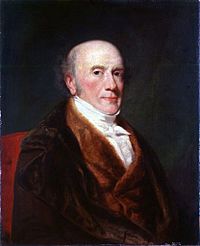Alexander Baring, 1st Baron Ashburton facts for kids
Quick facts for kids
The Lord Ashburton
|
|
|---|---|

Portrait of Lord Ashburton by George Peter Alexander Healy, 1842
|
|
| President of the Board of Trade | |
| In office 15 December 1834 – 8 April 1835 |
|
| Monarch | William IV |
| Prime Minister | Sir Robert Peel, Bt |
| Preceded by | Charles Poulett Thomson |
| Succeeded by | Charles Poulett Thomson |
| Master of the Mint | |
| In office 23 December 1834 – 8 April 1835 |
|
| Monarch | William IV |
| Prime Minister | Sir Robert Peel, Bt |
| Preceded by | James Abercromby |
| Succeeded by | Henry Labouchere |
| Personal details | |
| Born | 27 October 1774 |
| Died | May 12, 1848 (aged 73) Longleat, Wiltshire, England |
| Nationality | British, English |
| Political party | Tory |
| Spouse | Ann Louisa Bingham (m. 1798) |
| Children | 9 |
| Parents | Sir Francis Baring, Bt Harriet Herring Baring |
Alexander Baring, 1st Baron Ashburton (born October 27, 1774 – died May 12, 1848) was an important British politician and financier. He was a member of the famous Baring family. Alexander was the second son of Sir Francis Baring, 1st Baronet, and Harriet Herring. He lived in places like The Grange in Hampshire and Ashburton in Devon.
Contents
Early Life and Family Business
Alexander Baring was born on October 27, 1774. His parents were Harriet Herring and Sir Francis Baring, 1st Baronet. His father and uncle, John Baring, started a trading company in London. This company later became the well-known Barings Bank.
Alexander had several siblings. His brother, Sir Thomas Baring, 2nd Baronet, also became a Baronet. Another brother, Henry Baring, was a Member of Parliament. His family had strong connections to business and finance. His grandfather, Johann Baring, came to England from Germany in 1717 and started a wool business.
A Career in Finance and Politics
Alexander learned the family business from a young age. He became a partner at a company called Hope & Co. He traveled to the United States for land deals. There, he made many important connections with wealthy American families.
In 1807, Alexander became a partner in his family's company. The company's name changed to Baring Brothers & Co.. When Henry Hope passed away in 1811, the London offices of Hope & Co. joined with Baring Brothers & Co. This made the Baring company even bigger and more powerful.
Alexander Baring's Political Role
Alexander Baring served as a Member of Parliament for several areas. He represented Taunton from 1806 to 1826. Later, he served for Callington, Thetford, and North Essex.
He often looked at politics from a business point of view. For example, he disagreed with rules that limited trade with the United States in 1812. He also opposed a law in 1826 that stopped the use of small banknotes.
In 1834, Alexander Baring became the Master of the Mint in Robert Peel's government. This role involved overseeing the making of coins. When Peel retired in 1835, Alexander was given a special title. He became Baron Ashburton. This meant he was now a member of the House of Lords.
Important Treaty with America
In 1842, Lord Ashburton was sent to America again. He helped create an important agreement called the Webster–Ashburton Treaty. This treaty solved a border dispute between Maine (in the U.S.) and Canada (which was part of Britain).
The treaty also made other agreements. It arranged for the return of certain criminals between the two countries. Both countries also agreed to send ships to the coast of Africa. Their goal was to help stop the slave trade. They also agreed to work together to convince other countries to close slave markets.
Lord Ashburton was also a trustee for important places. These included the British Museum and the National Gallery. He was also a privy councillor.
Compensation for Slavery
When slavery was ended in the 1830s, Alexander Baring received money as compensation. This was because he owned plantations where enslaved people worked. He received payments for nearly 500 enslaved people across four different estates. These estates were in places like British Guiana and St Kitts.
Personal Life and Family
On August 23, 1798, Alexander Baring married Ann Louisa Bingham. Ann was from Philadelphia, United States. Her father, William Bingham, was a U.S. Senator and a very rich man.
Alexander and Ann had nine children together:
- Bingham Baring, 2nd Baron Ashburton (1799–1864)
- Francis Baring, 3rd Baron Ashburton (1800–1868)
- Harriet Baring (1804–1892)
- Frederick Baring (1806–1868)
- Anne Eugenia Baring (died 1839)
- Alexander Baring (1810–1832)
- Arthur Baring (1818–1838)
- Louisa Emily Baring (died 1888)
- Lydia Emily Baring (died 1868)
Lord Ashburton passed away on May 12, 1848, in Longleat, Wiltshire. His wife, Ann, died a few months later in December 1848.
Descendants of Lord Ashburton
Through his children, Alexander Baring had many descendants. His eldest son, Bingham, had a daughter named Mary Florence Baring. She married William Compton, 5th Marquess of Northampton. His second son, Francis, had a son named Alexander Baring, 4th Baron Ashburton. He also had a daughter, Maria Anne Louisa Baring, who married William FitzRoy, 6th Duke of Grafton.
Quotes
A famous quote about the Baring family comes from the Duke of Richelieu. He once said, "There are six main powers in Europe; Britain, France, Austria-Hungary, Russia, Prussia and Baring-Brothers!" This shows how important and powerful the Baring family's bank was in Europe.
 | James Van Der Zee |
 | Alma Thomas |
 | Ellis Wilson |
 | Margaret Taylor-Burroughs |

